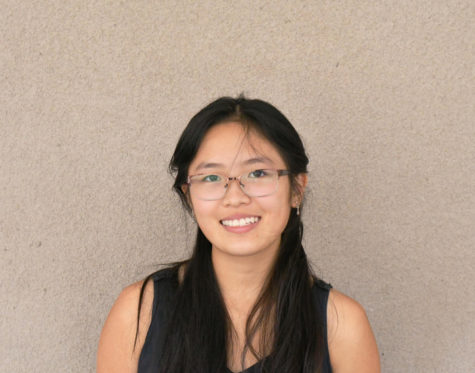Hou attends protest, advocates for AAPI voice
April 8, 2021

On most Sunday afternoons, Joanna Hou (12) spends her time at home, relaxing or doing work for school and extracurriculars. On March 21, however, she was at an intersection across from Torrey Pines High School with nearly 300 protesters, voicing her support for the Asian-American community in San Diego.
This push to show solidarity was the basis of the organization of the event in the first place; the protest was a part of a series of recent rallies meant to show support for the Asian American and Pacific Islander (AAPI) community across San Diego. After xenophobic and racist attacks perpetrated against the AAPI community, ncluding a shooting in an Atlanta spa that left six Asian-Amercan women dead, there were various coordinated efforts lead by students and community members. This rally was one of the many that have taken place all over San Diego in the past month.
After hearing about the protest the night before, Hou decided to attend as a show of solidarity with her fellow Asian-Americans against racism.
“I went because I felt a mixture of both concern for the Asian-American community and deep anger at the recent hate crimes,” she said.
Hou’s own experiences have influenced her thoughts on attending and her own role as an advocate for her own community. While she has attended protests for other causes in the past, this is one of the first times that the issue has hit so close to home, especially since Hou herself has elderly relatives at risk.
“As an Asian-American, I think I’ve always experienced microaggressions to a certain degree,” Hou said. “Obviously, racism is very much prevalent in the U.S, but the recent Atlanta shooting really put it into the context of the Asian-American community.”
According to Hou, loved ones and close friends have experienced racism in the form of both micro aggressions and outright yells of “go back to your country,” and the shooting only highlighted what has been a time of profound turmoil for many Asian-Americans.
“To be honest, as an Asian-American, I’m tired of this misguided pity and accountability dodging,” Hou said. “It’s always aggravating when people say ‘this isn’t a reflection of the U.S,’ as if the shooting was just an isolated incident and not the build-up of profoundly racist rhetoric.”
According to Hou, after the beginning of the COVID-19 pandemic, it became a lot more disturbing and a lot more terrifying to be Asian than before, when many Asians were not as targeted.
“I’ve been pretty uneasy,” Hou said. “Especially because of a lot of the things that were said. Since [COVID-19] was branded as the ‘Chinese virus,’ a lot of anti-COVID sentiment was expressed as xenophobic and vitriolic hate against Asians.”
Beyond national occurrences, however, Hou’s experience as a student has influenced the decisions that she’s made regarding the protests.
“For the most part, Asians aren’t as much of a minority at Westview [as we are at other schools],” Hou said. “And that’s a huge privilege. There are obviously events where people will say things like ‘ching chong’ or ask ‘where are you really from,’ but there has always been a feeling of community, at least in my experience.”
Hou voiced some of these thoughts at the protest after being interviewed by CBS, yet was surprised to find that the interviewer tried to spin the protest into a ‘violence against women’ rally. She said the experience only reinforced her conviction that more awareness was needed when it came to AAPI racism in the U.S.
“Not to brush off the recent crimes against women,” Hou said. “But the protest wasn’t meant to highlight that, and our goal was to cover Asian-American solidarity.”
Hou said she hopes to continue protesting in the future. Like many of the student attendees of the March 21 rally, Hou went for the sake of supporting her fellow Asian-Americans, and her long-term goal is to continue to do so.
“I’ll definitely continue to go to whatever else is organized after,” Hou said. “This kind of advocacy is something that’s really important to me and I want to keep on pushing for a louder AAPI voice in our community.”


